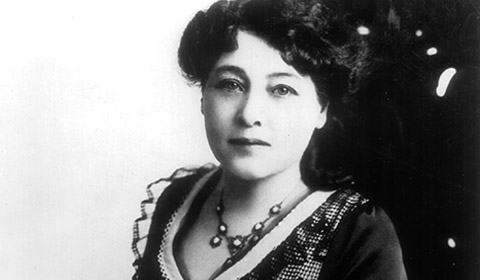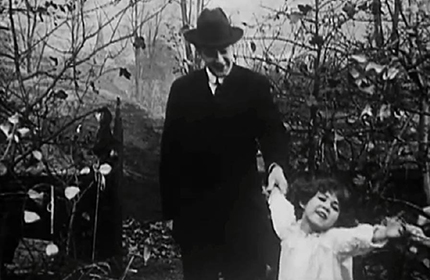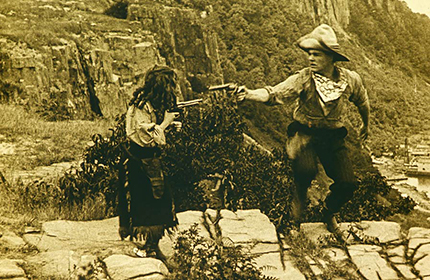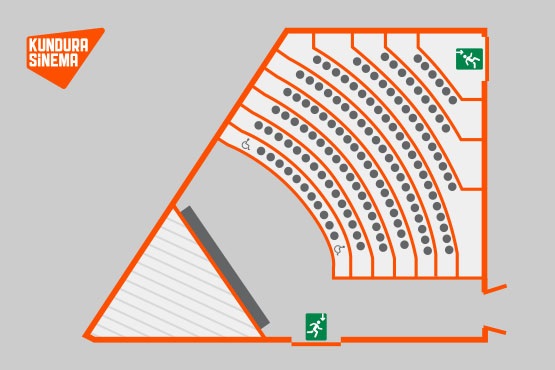Free of Charge
CLICK HERE for the registration form.
Free event, registration is needed. Before coming to see the film you choose, please fill the form.
14:30 - 16:00 PANEL: Pioneering Female Writers and Screenwriters in Cinema
Speakers: Aslı Davaz, Canan Balan, Elif Rongen-Kaynakçı
Aslı Davaz “Necile Tevfik’in Sinema Teknikleri, Sessiz ve Sesli Senaryoları ve Hollywood ile İlişkileri (1928-1935)”
There are six documents under the title of cinema and screenplays in Necile Tevfik Archive Annotated Catalog. These documents are about cinema techniques and the scripts she wrote. The document under the title of cinema techniques includes notes by Necile Tevfik explaining how to shoot a movie. Under the scenario title, there are silent and sound cinema. Documents related to silent cinema scenarios are documents covering the period between 1928 and 1935, when Necile Tevfik described the two scenarios she wrote for silent cinema to FBO Studios and Jacques Feyder in Hollywood.
Canan Balan “Hoca ve Asistanı Sinemada: Halide Edip ve Sabahat Filmer”
While doing her internship at Ordu Film Center, Sabahat Filmer, who worked as an assistant and writer in the fiction films of the period (1919-1920), also held Sultanahmet meetings during the occupation period with Halide Edip, who aslo wrote fiction and essays on cinema. This presentation focuses on the first women who began working behind the camera and Filmer’ and Adıvar’s contributions to the cinema of Turkey.
Elif Rongen Kaynakçı “Beyazperdeye yansıyan kadın senaristler”
What kind of image of a female screenwriter do we encounter in the archive footage we find while tracing the women of silent cinema? It will be a presentation where we will watch and discuss these images.
-
15:30 -15:45 interval
-
15:45 -17:00 SCREENING
Women of Ryazan
Director: Ivan Pravov, Olga Preobrazhenskaya
Soviet Union, 1927, 67’
Women of Ryazan tells the story of Anna and Wassilissa, sisters-in-law living in the village of Ryazan. The story starts in 1914 just before the outbreak of WWI and focuses on the relationship of Anna with Ivan and Wassilissa with Nikolai. However, once both men are drafted for war, the women's social positions change dramatically; Anna becomes very vulnerable, while Wassilissa gets more assertive and refuses to become a victim of the circumstances.
---
Aslı Davaz studied French language and literature at University of Paris VIII. She is one of the founders of the Women's Library and Information Center Foundation in 1990 in Istanbul, Turkey. She is one of a few researchers who specialized in women's archives in Turkey, and for many years she carried out research studies on this subject. Davaz spent much of the past twenty-nine years engaging in efforts aimed to the acquisition, preservation, and dissemination of documents related to women’s history and she has been working in many projects regarding women centred archives and women’s memory. She published three books: *“An Essay” on Reading a Woman's Private Papers: Annotated Catalogue of the Necile Tevfik Private Papers (1924-1954), 2019; *Unequal Sisterhood: International and Middle East Women’s Movements, the 1935 Congress and the Union of Turkish Women, 2014.; *From Hanımlar Âlemi to Roza: Bibliography of Women Periodicals 1928-1996, 1998. The Annotated Catalogue of Necile Tevfik Private Papers has been a long run study, on the private papers of an early republican feminist. She currently works on women’s history, women centred archives and serves actually as the president of the Executive Board of the Foundation (2019-2021).
Canan Balan has been a doctorate professor at İstanbul Şehir University since 2010. She received her PhD from St Andrews University's film research program with a thesis on Early Cinema and Audience Culture in Istanbul. Since then, she has published articles addressing the intellectual figures who lived in Istanbul at the beginning of the twentieth century on the subject of cinema. She is still working on themes such as cinema watching, film production&writing.
Elif Rongen-Kaynakçı is the Curator of Silent film at EYE Filmmuseum, the national film heritage institute of the Netherlands. Since 1999, she has worked on the discovery, restoration and presentation of many presumed lost films. These include Beyond the Rocks (starring Gloria Swanson and Rudolph Valentino, 1922),The Floor Below (starring Mabel Normand, 1918), Az utolsó hajnal (Michale Curtiz, 1917), and many more. Her work often gravitates around the forgotten or overlooked women within silent cinema, such as Rosa Porten, Little Chrysia, Tsuru Aoki, Olive Thomas, etc. She is a member of the Steering Committee of the Women Film History International, and the co-organizer of the last Women and the Silent Screen biannual conference, held in Eye in 2019. She is directly involved with the archival festivals Il Cinema Ritrovato, Le Giornate del Cinema Muto and Istanbul Silent Cinema Days.
IMPORTANT INFORMATION
Seating Plan: Seats are not numbered.
The Venue: Guests could enter the venue 2 hours before the session for which they have a ticket.
We would like to remind that the ticket allows enjoying the designated areas only. Visiting the film sets in Beykoz Kundura is not permitted. We kindly ask you to stay in the designated area.
Recording with a professional camera is not allowed unless you have a written permit. We ask you to leave your recording devices to the security point at the entrance of Beykoz Kundura.
Screenings: All the films, except from the children’s film, will be screened in the original language with Turkish subtitles. In case of a technical problem in the electronic subtitle system, first we will try to fix it and if it could not be fixed, the screening will be held without subtitles.
After the sessions begin, it is not allowed to enter the hall. We kindly ask our guests to attend the sessions on time.
Children: Children under the age of 3 are not allowed in the movie theaters to protect their hearing health. We kindly ask you not to bring children under the age of 7 to the movie theater, unless there is a children’s movie.
Recording: Recording by camera, mobile phone or any recording device is not allowed during the sessions.
Food&Drink: You may enjoy the food and drink services at Kundura Cinema or you may prefer Beykoz Kundura’s restaurant, Demirane.
Changes in the Program: Don’t forget to follow us on social media! If there is a change in the scheduled program due to reasons beyond our control, you can get information from our website and social media accounts.
TICKET INFORMATION
Tickets are available at Beykoz Kundura website and Kundura Box Office.
Kundura Box Office Working Hours:
Weekdays: 10 am – 5 pm
Weekend: 12 pm – 9 pm
For Information: gise@beykozkundura.com
The guests with a discount ticket are required to provide their identification card at the entrance.
No refunds and change unless the program changes.
You can follow our updates and campaigns on our social media accounts.








